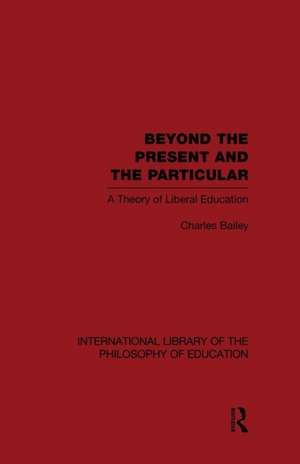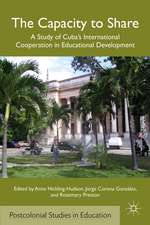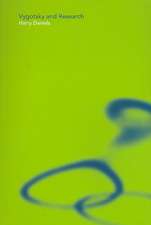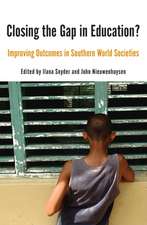Beyond the Present and the Particular (International Library of the Philosophy of Education Volume 2): A Theory of Liberal Education
Autor Charles H. Baileyen Limba Engleză Paperback – 4 mar 2015
| Toate formatele și edițiile | Preț | Express |
|---|---|---|
| Paperback (1) | 317.21 lei 6-8 săpt. | |
| Taylor & Francis – 4 mar 2015 | 317.21 lei 6-8 săpt. | |
| Hardback (1) | 694.74 lei 6-8 săpt. | |
| Taylor & Francis – 7 dec 2009 | 694.74 lei 6-8 săpt. |
Preț: 317.21 lei
Nou
Puncte Express: 476
Preț estimativ în valută:
60.70€ • 63.53$ • 50.52£
60.70€ • 63.53$ • 50.52£
Carte tipărită la comandă
Livrare economică 31 martie-14 aprilie
Preluare comenzi: 021 569.72.76
Specificații
ISBN-13: 9781138871342
ISBN-10: 1138871346
Pagini: 272
Dimensiuni: 138 x 216 x 14 mm
Greutate: 0.32 kg
Ediția:1
Editura: Taylor & Francis
Colecția Routledge
Locul publicării:Oxford, United Kingdom
ISBN-10: 1138871346
Pagini: 272
Dimensiuni: 138 x 216 x 14 mm
Greutate: 0.32 kg
Ediția:1
Editura: Taylor & Francis
Colecția Routledge
Locul publicării:Oxford, United Kingdom
Public țintă
General, Postgraduate, Professional, and UndergraduateCuprins
1. Introduction - Theory and Education Part 1: Justification of Liberal Education 2. Education and its Justification 3. Types of Education. 4. The Justification of Liberal Education Part 2: Content and Method 5. Some Preliminary Ideas 6. Three Accounts Considered 7. The Content of a Liberal Education 8. The Methods of a Liberal Education Part 3: Challenges to Liberal Education 9. The Challenge of Economic Utility 10. The Challenge of Relativism, Ideology and the State 11. Teachers, Assessment and Accountability
Descriere
Charles Bailey advances a modern characterization and justification of liberal education and defends such a view of liberal education against contemporary challenges. The book will be of special value to those guiding educational policy, designing curricula and reflecting on their own teaching practice. The author offers a positive account of the content of liberal education, after a consideration and critique of the work of Paul Hirst, Philip Phenix and John White and follows this with an account of teacher strategy, attitude and methodology appropriate to liberal education.












